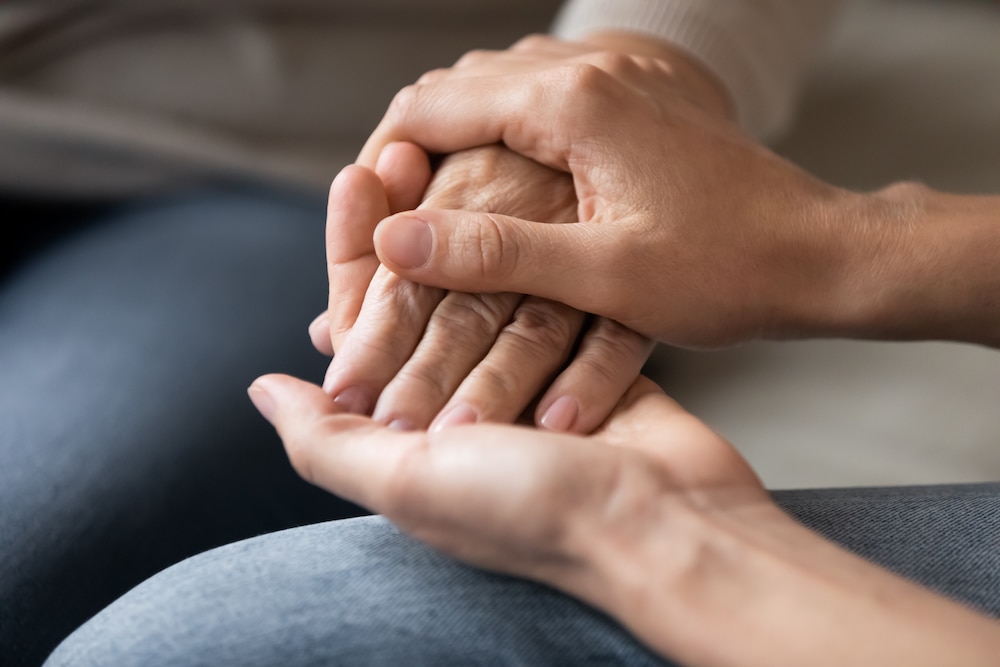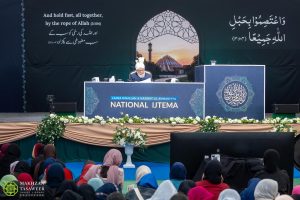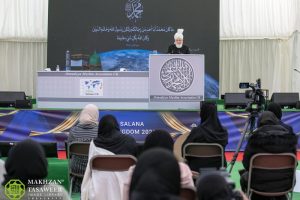
© Shutterstock
Mother’s Day has become a staple celebration for many homes around the world. The occasion usually takes the shape of family gatherings, gestured with a flurry of cards and flowers. Whilst engrossed in gifts and merriments, few ponder over the origins of this day and the deeper meaning it can hold. In the UK, Mother’s Day began as Mothering Sunday – a religious tradition dating back to the 16th century, when children who had left home to work in domestic service, were allowed to return to visit their mothers and their ‘mother church’ on the fourth Sunday of Lent.[1] Over time, it evolved into a broader celebration of motherhood.
Meanwhile, in the United States, the modern iteration of Mother’s Day was largely shaped in the early 20th century by the social activist Anna Jarvis. Deeply devoted to her own mother, Jarvis envisioned a day to honour the sacrifices mothers made for their children when she organised a memorial service on the anniversary of her mother’s death.[2] Ironically, she spent her remaining life waging a campaign against it, lamenting its rapid commercialisation “A printed card means nothing”[3] she argued, heartbroken that the sincerity of the day had been drowned in consumerism.
Although Jarvis’ fears materialised with Mother’s Day spending surging to an estimated $35.7 billion worldwide in 2023,[4] there is a growing movement that seeks to reject the commercialisation and token gestures of this day and return to the deeper, more meaningful appreciation of motherhood as a fundamental personal and spiritual role. Many from a religious perspective agree that the sacredness of motherhood should not be confined to one day but instead should be a year-round recognition of this pivotal position.
In current times, we see mothers navigating an increasingly complex and demanding landscape. Feminist movements have expanded opportunities for women but have also introduced new expectations. Economic pressures in the modern day often demand dual incomes, whilst societal norms still tend to place the bulk of caregiving responsibilities on mothers. The result is a constant balancing act, with women juggling multiple identities: mother/professional/caregiver/wife, often with little support or meaningful recognition.
Yet our rich Islamic history present role models who successfully traversed multi-faceted challenges of their time with remarkable resilience and unwavering determination. Khadija bint Khuwaylid (ra) the first wife of the Prophet Muhammad (sa), was born in 555AD, centuries before the advent of modern feminism. Khadija (ra) was a well-educated, noble, elegant and astute entrepreneur, renowned for her integrity and exceptional intellect, surpassing many of her male counterparts. She managed a thriving business empire – transporting a caravan of over 800 camels of trade to Syria and Yemen, which rivalled the combined caravans of all the traders of the Quraish.[5] Alongside this, she was also a devoted mother to what is believed to be at least ten children in her household, including Muhammad’s (sa) adopted son Zayd ibn Harithah (ra). Yet her motherliness transcended her household to the wider society.
Allah Almighty Himself honoured Khadija (ra) and the wives of the Prophet (sa) with the noble title of Umm-al-Mu’minin ‘Mother of the Believers’.[6] Khadija’s (ra) role as Umm al-Mu’minin was not limited to nurturing her biological children but encompassed guiding, uplifting, and protecting the early Muslim community though emotional, moral and spiritual leadership. Her home was a sanctuary of compassion; attracting orphans, widows, the sick, travellers and she was renowned for paying the bridal dowry for many girls in the area, in true motherly spirit. Thus, Khadija (ra) was not only a devoted mother to her own children, but also a maternal presence for her entire community: a provider, a nurturer, and a protector. In every sense, she was a mother of her society, the Mother of Believers. Yet despite all the various demands this would have presented, Khadija (ra) never viewed her roles as conflicting, instead, she embraced them all, setting a timeless example of balance and strength.
Her legacy reminds us that motherhood in Islam is not necessarily limited to a domestic sphere, but is a position of influence, governance, and honour; deeply embedded in community by laying the necessary foundations for the future generation to flourish.
We can draw great strength and foresight from women like Khadija (ra) in a time when motherhood can feel torn between priorities, pressures and perfection, as they offer us a blueprint of how to nurture the next generation through the lens of immeasurable worth. As His Holiness Hazrat Mirza Masroor Ahmad (aba) the current Head of the Ahmadiyya Muslim Community has said:
“Remember that the key for any nation to thrive and progress lies in the hands of the mothers of that nation”[7].
As we approach this Mother’s Day, let us look beyond the idea of motherhood as only the biological act of bearing a child, and let us look beyond the commercial gesture of flowers and cards. Let us herald the examples of Umm-al-Mu’minin and reclaim motherhood as a sacred honour endowed to women in shaping hearts, minds, and ultimately, the future.
About the author: Farhana Dar is a Law graduate from the London School of Economics and currently works in Business Development. As a mother of three, she brings both personal insight and academic curiosity to her writing, with a particular interest in the role and status of women in Islam and how faith shapes modern family life.
Endnotes
[1] Diller, H. (1990). Celebrations that Matter. p35 (Augsburg Fortress Publishing).
[2] Phillips, K (2024). ‘She invented Mother’s Day- then waged a lifelong campaign against it’. Washington Post. 7 May.
[3] Handwerk, B. (2011) Why Mother’s Day horrified, ruined its own mother, History. Available at: https://www.nationalgeographic.com/history/article/110508-mothers-day-google-doodle-history-jarvis-nation-gifts-facts (Accessed: 04 May 2025).
[4] Silverpush. (2024). Mother’s Day Spending Across the World – Silverpush. [online] Available at: https://www.silverpush.co/mothers-day-spending-across-the-world
[5] Muhammad ibn Saad, Tabaqat vol. 8. Translated by Bewley, A. (1995). The Women of Madina, p. 10.




Farhana, I believe readers would truly appreciate this insight into how Mother’s Day started in the UK and USA from your article—I certainly did! My mom always said that in Islam, every day is Mother’s Day.
This was the first Mother’s Day after my beloved mother, Syeda Bilquis Sadaqat Sami Jadran, passed away last September 2024 in Virginia. May Allah grant her Jannatul Firdous. Not that I ever needed to buy anything to make my mom feel loved, but we sometimes talked about how, in Islam, mothers are to be respected, and children and parents should maintain a loving bond throughout their lives.
Being a mother of three myself, I believe she was giving me advice.
Her own mother, the late Iqbal Begum Malik of Sadar Karachi—may Allah grant her Jannatul Firdous—was a great example. She dedicated much of her time to Jamaat work while raising her seven children and teaching them about religion. I have wonderful memories of both of them, especially from Ahmadiyya Hall during Jummah. I only wish I could teach my children as they did.
Sharing here some of what my mom taught me from Hadith and the Holy Quran on this topic:
One of the hadiths of our beloved Prophet Muhammad (peace and blessings of Allah be upon him) expresses the importance of respecting and being kind to one’s mother so clearly:
Abu Hurairah (May Allah be pleased with him) reported:
A person came to the Messenger of Allah (PBUH) and asked,
“Who among people is most deserving of my fine treatment?”
He (PBUH) said, “Your mother.”
He again asked, “Who next?”
“Your mother,” the Prophet (PBUH) replied again.
He asked, “Who next?”
He (the Prophet (PBUH)) said again, “Your mother.”
He again asked, “Then who?”
Thereupon he (PBUH) said, “Then your father.”
In another narration:
“O Messenger of Allah! Who is most deserving of my fine treatment?”
He (PBUH) said, “Your mother, then your mother, then your mother, then your father, then your nearest, then nearest.”
[Al-Bukhari and Muslim]
Reference: Riyad as-Salihin 316
In-book reference: Introduction, Hadith 316
Sahih al-Bukhari 5971
On another occasion, the Holy Prophet (peace and blessings of Allah be upon him) emphasized the love and respect due to the mother by saying:
“Paradise lies at the feet of the mother.”
The full hadith can be read here (Sunan al-Nasā’ī 3104).
The Holy Quran also reinforces the importance of being kind to parents:
Surah Bani Isra’il (17:24)
“Thy Lord has commanded, ‘Worship none but Him, and show kindness to parents. If one of them or both of them attain old age with thee, never say unto them any word expressive of disgust nor reproach them, but address them with excellent speech.'”
Surah Bani Isra’il (17:25) “And lower to them the wing of humility out of tenderness. And say, ‘My Lord, have mercy on them even as they nourished me in my childhood.’”
Surah Al-Ahqaf (46:16)
“And We have enjoined on man to be good to his parents. His mother bears him with pain and brings him forth with pain. The bearing of him and his weaning takes thirty months. Then, when he attains full maturity and reaches the age of forty years, he says, ‘My Lord, grant me the power that I may be grateful for Thy favor which Thou hast bestowed upon me and upon my parents, and that I may do such good works as may please Thee. And make my offspring righteous for me. I do turn to Thee, and, truly, I am of those who submit to Thee.'”
Farhana, your article beautifully highlights the respect for mothers in Islam, especially through the example of Hazrat Khadija (may Allah be pleased with her). As the first Muslim woman, she embodied strength, wisdom, and faith, supporting Prophet Muhammad (peace and blessings be upon him) while being a devoted mother. Truly inspiring!
May Allah help us, as mothers, to be good role models and guide our children to follow the teachings of Islam in this regard. Ameen.